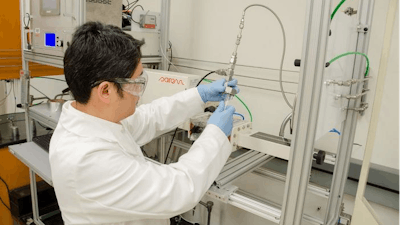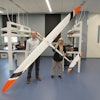
Polypropylene, a plastic used in everything from car parts and lawn chairs to food packaging and clothing, may soon become more environmentally friendly because of West Virginia University research.
The world produces more polypropylene than any other plastic resin except polyethylene. It’s found in kitchenware, sports equipment, bleach bottles, pipes, battery casings, medical devices, textiles and more. Most polypropylene products are single-use plastics, like fast food to-go cups. Almost all of them eventually end up as trash, filling landfills or polluting the environment.
A $1 million grant from the U.S. Department of Energy supports WVU chemical engineer Yuxin Wang’s effort to use microwave technology to recover the chemical compound propylene from old polypropylene products.
“We need to diversify our strategies for dealing with America’s abundant plastic waste,” said Wang, assistant professor in the WVU Benjamin M. Statler College of Engineering and Mineral Resources. “Currently polypropylene has a notably low recovery rate of only 1%, meaning 99% of polypropylene products become garbage. We want to change that by using microwave irradiation to recover propylene from polypropylene.”
With Srinivas Palanki, chair of the Department of Chemical and Biomedical Engineering, Wang will explore energy-efficient approaches to converting polypropylene back into propylene, which can be reused in new plastics or other products.
“We make 150.3 million metric tons of propylene every year through energy-intensive processes like ethane steam cracking,” Palanki said. “These processes require very high temperatures. If we can recover usable propylene from polypropylene, we’ll reduce energy and emissions throughout the lifecycle of these plastics, and we’ll improve productivity and efficiency for U.S. manufacturers.”
Other researchers’ attempts to recover propylene from polypropylene waste have relied on thermochemical approaches such as pyrolysis, in which the material is heated in an oxygen-free environment. But Wang explained that, so far, polypropylene has largely resisted those efforts.
“The pyrolysis of polypropylene typically results in a propylene yield of less than 25% even with an optimized process,” he said. “Our challenge is to use microwaves to do it in a way that is cost competitive and can be practically implemented.”
Wang sees two big advantages in using microwaves as an energy source: microwave technology enables precise and selective control over the process, and it allows propylene recovery to happen at much lower temperatures than in conventional thermal recovery processes — 300 degrees Celsius as compared to 600 or 700 degrees.
In Wang and Palanki’s approach, the microwave radiation is used to heat an intermediary “catalyst” material, which then transfers the heat to the polypropylene waste.
Their goal is to “upcycle” polypropylene. A form of recycling, upcycling processes material for reuse. But while most recycling breaks a material down into tiny pieces, enabling its use in a new product, upcycling breaks the material down into its original chemical components, which can then be used to manufacture a variety of products.
“In recycling, you crush a water bottle into small pieces and then use those pieces to build a bottle again. Recycling limits your utilization,” Wang said. “We want to generate chemicals that not only can be used to manufacture polypropylene again, but also can be valuable in other reactions.”
He added the study will expose WVU undergraduate and graduate students to the resources of the Advanced Photon Source facility at the Argonne National Laboratory in Illinois.
“APS has cutting-edge technology that we will use in this project, and this is a great opportunity to build the relationship between our academic research program and a national lab,” Wang said.
“As part of this study, WVU students will be able to use new techniques developed at APS for use in the Argonne ‘synchrotron,’ a kind of particle accelerator. The students will work with Argonne engineers like Tao Li, from Northern Illinois University, who’s an expert in the catalytic reaction processes we’re interested in. They’ll learn plastic upcycling mechanisms and become part of the solution for our plastic waste issue.”






















